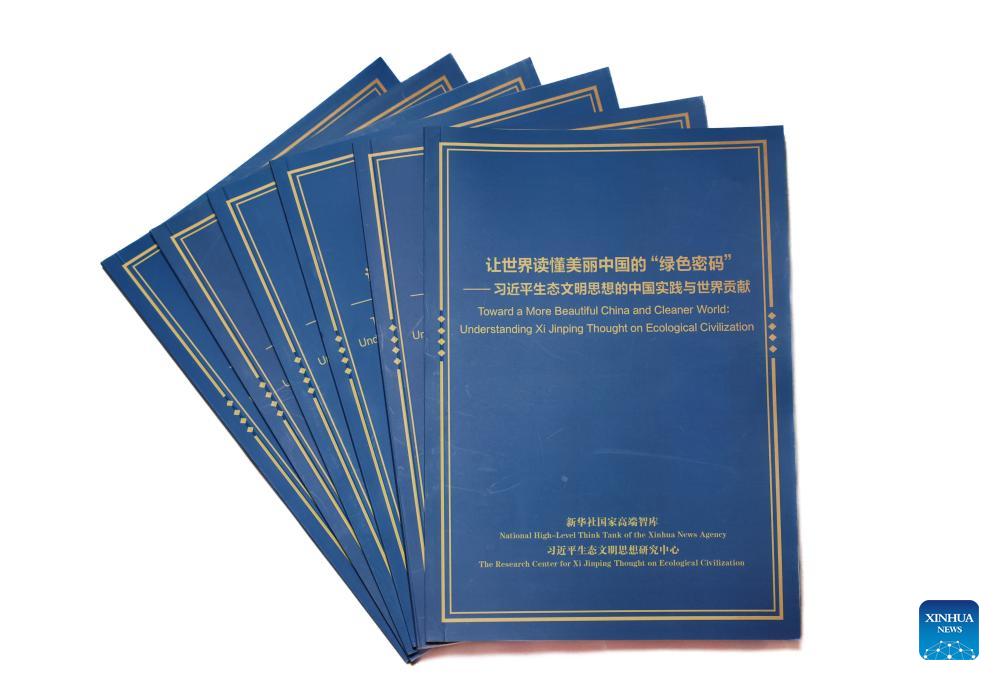
 0 Comment(s)
0 Comment(s) Print
Print E-mail Xinhua, November 27, 2024
E-mail Xinhua, November 27, 2024
This photo taken on Nov. 26, 2024 shows copies of a report titled "Toward a More Beautiful China and Cleaner World: Understanding Xi Jinping Thought on Ecological Civilization," released at the ongoing Global Panda Partners 2024 conference, in Chengdu, southwest China's Sichuan Province, Nov. 26, 2024. [Photo/Xinhua]
A report released on Tuesday expounds on China's ecological progress and contributions to global sustainability.
Titled "Toward a More Beautiful China and Cleaner World: Understanding Xi Jinping Thought on Ecological Civilization," the report stems from a collaboration between a national high-level think tank affiliated with Xinhua, China's state news agency, and the Research Center for Xi Jinping Thought on Ecological Civilization.
The report, released during the ongoing Global Panda Partners 2024 conference in Chengdu, capital city of southwest China's Sichuan Province, consists of four sections.
It outlines the historical context and key elements of Xi Jinping Thought on Ecological Civilization, reviews China's initiatives to advance eco-environmental conservation, defines the institutional frameworks supporting efforts to build a Beautiful China, and summarizes Chinese wisdom regarding the creation of a clean and beautiful world.
According to the report, China has consistently advanced the green and low-carbon transformation of its economy and society, made significant strides in the fight against pollution, achieved remarkable progress in ecological protection and restoration, and cultivated a societal shift toward a simpler, more sustainable, and environmentally friendly way of life.
As highlighted in the report, green development has become a prominent feature of Chinese modernization.
From 2012 to 2023, China supported its average annual economic growth at more than 6 percent with an annual energy consumption growth rate of 3 percent. Its energy consumption intensity dropped by 26.4 percent accumulatively during the same period, making China one of the countries in the world with the fastest decline in energy consumption intensity.
China has risen to significant environmental challenges and made substantial progress in advancing institutional reforms within the ecological civilization framework, the report says.
The country currently boasts a comprehensive legal framework for ecological and environmental protection, encompassing over 30 national laws, more than 100 administrative regulations, and over 1,000 local statutes. Additionally, the country has maintained a firm and unwavering stance against environmental violations.
Facts emphasized in the report showcase that China's eco-environment conservation endeavors bear profound significance that extends beyond its borders.
The country is committed to peaking carbon emissions by 2030 and achieving carbon neutrality by 2060 -- goals that will represent the largest reduction in carbon intensity globally and the fastest transition from carbon peaking to neutrality in history, the report notes.
China is taking the lead in the global transition toward clean energy, according to the report. The country ranks first globally in installed capacities for hydropower, wind, solar, and biomass energy, as well as new energy vehicle ownership.
China was the first country to achieve zero net growth in land degradation. Its efforts have significantly reduced desertified and sandified areas, contributing to a quarter of the world's newly added green spaces since 2000.
The report highlights that, as a major country, China has moved decisively from being a participant to a leader in global environmental governance.
According to the report, as of November 2024, China has signed 54 climate-related South-South cooperation agreements with 42 developing countries, hosted over 300 capacity-building workshops, and offered more than 10,000 training opportunities to over 120 developing nations.
China has launched the Belt and Road South-South Cooperation Initiative on Climate Change, established the Belt and Road Energy Partnership, and formed the Belt and Road Initiative International Green Development Coalition with over 170 partners in more than 40 countries, the report notes.
At Tuesday's event, former UNESCO Director-General Irina Bokova expressed appreciation for China's commitment to advancing ecological civilization.
"In order to be a credible partner in international cooperation, you have to start to work at home," Bokova told Xinhua. Noting that China has made significant decisions and actions both domestically and internationally, Bokova expressed the hope that these efforts will continue to contribute to the global environmental agenda.
As the only media-based think tank in China's array of national high-end think tanks, the national high-level think tank of Xinhua, with policy research as its main focus, has in recent years carried out forward-looking, strategic and preparatory research concerning major domestic and global issues -- producing many influential research outcomes in the process.
Themed "Harmonious Coexistence Between Man and Nature," Global Panda Partners 2024 serves as a platform for dialogue and exchange, aiming to foster consensus and collaborative efforts in building a global ecological civilization.